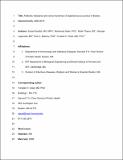Trends in Antibiotic Susceptibility in Staphylococcus Aureus in Boston, Massachusetts, from 2000 to 2014
Author(s)
Kanjilal, Sanjat; Sater, Mohamad R. Abdul; Thayer, Maile; Kim, Soohong; Grad, Yonatan H.; Lagoudas, Georgia K; Blainey, Paul C; ... Show more Show less
DownloadBlainey_Trends in Antibiotic.pdf (1.238Mb)
OPEN_ACCESS_POLICY
Open Access Policy
Creative Commons Attribution-Noncommercial-Share Alike
Alternative title
Trends in Antibiotic Susceptibility in Staphylococcus aureus in Boston, Massachusetts, from 2000 to 2014
Terms of use
Metadata
Show full item recordAbstract
The rate of infection by methicillin-resistant Staphylococcus aureus (MRSA) has declined over the past decade, but it is unclear whether this represents a decline in S. aureus infections overall. To evaluate the trends in the annual rates of infection by S. aureus subtypes and mean antibiotic resistance, we conducted a 15-year retrospective observational study at two tertiary care institutions in Boston, MA, of 31,753 adult inpatients with S. aureus isolated from clinical specimens. We inferred the gain and loss of methicillin resistance through genome sequencing of 180 isolates from 2016. The annual rates of infection by S. aureus declined from 2003 to 2014 by 4.2% (2.7% to 5.6%), attributable to an annual decline in MRSA of 10.9% (9.3% to 12.6%). Penicillin-susceptible S. aureus (PSSA) increased by 6.1% (4.2% to 8.1%) annually, and rates of methicillin-susceptible penicillin-resistant S. aureus (MSSA) did not change. Resistance in S. aureus decreased from 2000 to 2014 by 0.8 antibiotics (0.7 to 0.8). Within common MRSA clonal complexes, 3/14 MSSA and 2/21 PSSA isolates arose from the loss of resistance-conferring genes. Overall, in two tertiary care institutions in Boston, MA, a decline in S. aureus infections has been accompanied by a shift toward increased antibiotic susceptibility. The rise in PSSA makes penicillin an increasingly viable treatment option.
Date issued
2017-11Department
Massachusetts Institute of Technology. Department of Biological EngineeringJournal
Journal of Clinical Microbiology
Publisher
American Society for Microbiology
Citation
Kanjilal, Sanjat, et al. “Trends in Antibiotic Susceptibility in Staphylococcus Aureus in Boston, Massachusetts, from 2000 to 2014.” Edited by Nathan A. Ledeboer. Journal of Clinical Microbiology 56, 1 (November 2017): e01160-17 © 2017 The Authors
Version: Original manuscript
ISSN
0095-1137
1098-660X